A Five-Alarm Fire for Free Speech
The Trump Administration’s 100 Day Assault on Free Expression
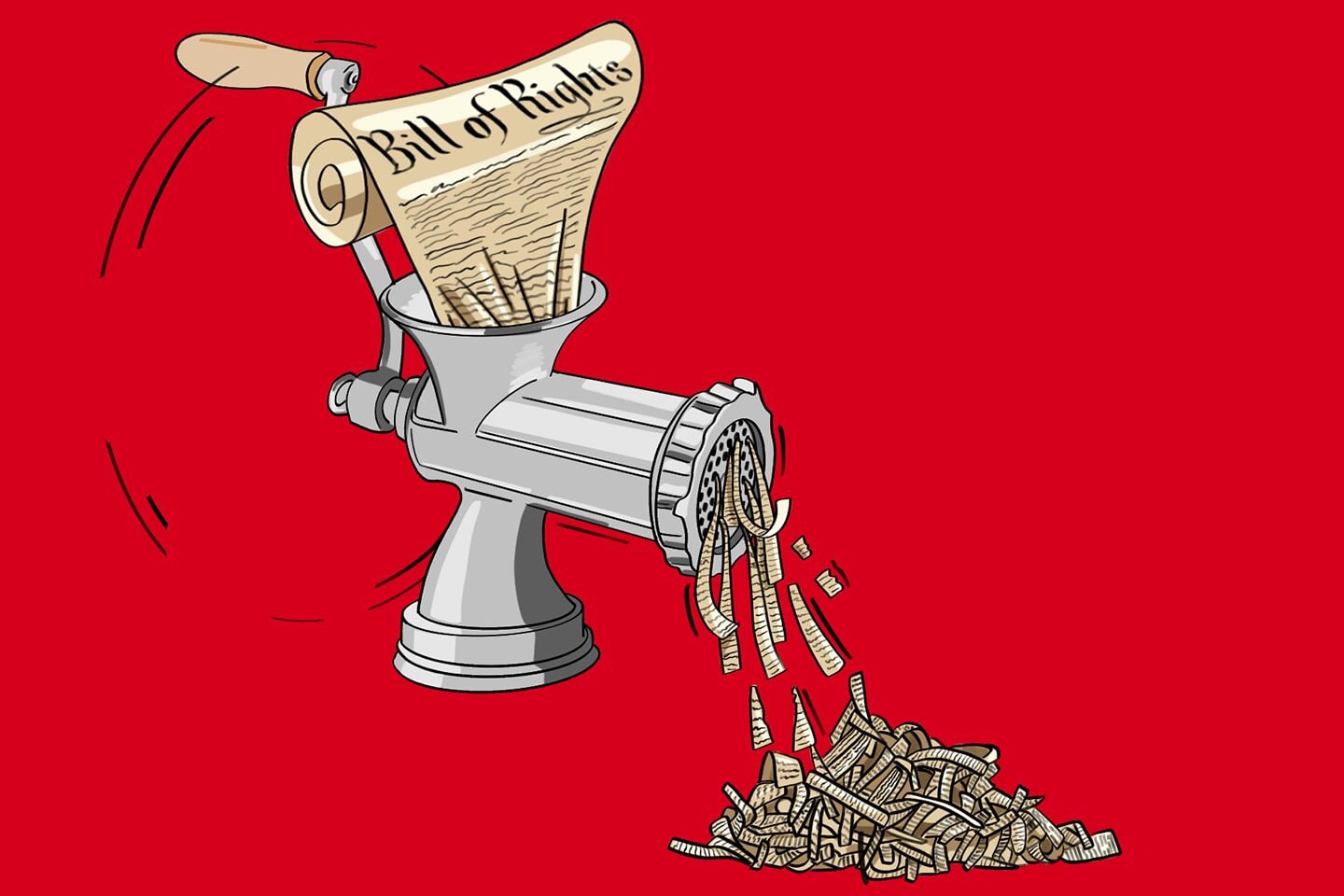
Two things form the bedrock of any open society — freedom of expression and rule of law. If you don’t have those things, you don’t have a free country.
From Jan. 16, 2008 Times of India interview with Salman Rushdie, author and former president of PEN America
PEN America Experts:
Co-Chief Executive Officer
Sy Syms Managing Director, U.S. Free Expression Programs
Managing Director, Washington
Managing Director, PEN/Barbey Freedom to Write Center
Take Action
Join PEN America in calling on Congress to speak up for free expression and urge them to be strong advocates for the freedoms that set the United States apart from autocracies.
Attacks On Speech Betray A Bedrock Principle Of Our Democracy
As seen in chilling surveillance video, Rümeysa Öztürk, a backpack-wearing graduate student on her way to break the Ramadan fast, is surrounded by plainclothes officers, many in masks, then handcuffed and bundled into an unmarked SUV. She was not the first international student targeted by the Trump administration for her speech — in this case, reportedly an opinion piece she co-authored for the Tufts student newspaper published more than a year earlier — and she has not been the last.
The unconstitutional detention of Öztürk, a student and aspiring children’s book author, in retaliation for writing an oped is part of a frontal assault on freedom of expression by the Trump administration in its first 100 days unlike anything seen in this country since the McCarthy era. Through vague, vitriolic, and overbroad executive orders and other actions, the Trump administration has attacked rights, ideas, and words it doesn’t agree with, justifying some edicts by claiming an intent to liberate Americans through a twisted and false version of “restoring free speech.”
In the fusillade of executive orders over 100 days, the Trump administration has betrayed the bedrock principle of our democracy — that you should be free to express your opinion without fear of punishment by the government. You should be free to say the emperor has no clothes.
Many previous administrations have taken actions that were questionable from a First Amendment perspective. The Biden administration may well have blurred the line into jawboning tech companies; the Obama administration restricted press access and prosecuted government employees who leaked information to reporters. And the George W. Bush administration’s Patriot Act, with its sweeping surveillance powers, laid the groundwork for much of the repression we are seeing now.
But what is happening today is of a different kind altogether. No federal administration has moved as swiftly to exert broad new controls over what people can say, read, learn, research, and think. The heavy-handed imposition of government ideology and efforts to instill a culture of fear echo the tactics of repressive regimes, and they are having the intended effect. Across not just government agencies, but schools and universities, corporations, libraries, museums, and the media, there is already a pervasive sense that one must watch what one says in order to avoid government retaliation.
If free speech is the bedrock of democracy, fear and paranoia lay the groundwork for authoritarianism. Those who choose not to concede or self-censor, who choose to speak out despite the risks, offer us the clearest path to protecting our fundamental rights and safeguarding our democracy. Courage is contagious, and we will all need more of it in the days to come.
The heavy-handed imposition of government ideology and efforts to instill a culture of fear echo the tactics of repressive regimes, and they are having the intended effect.
Dozens of the more than 130 executive orders and actions taken by the Trump administration in the first 100 days have alarming implications for free expression. Among them:
- Attacking language and identities: Executive orders attacking diversity, equity, and inclusion, and what the administration called “radical gender ideology” eroded civil rights protections and contributed to federal departments and agencies banning more than 350 words, by PEN America’s count. The utterly chilling array of everyday terms forbidden in government agencies, websites, or even scientific research proposals to federal agencies have cast a broad chilling effect, eroding our ability to engage freely in dialogue and advance human knowledge. The message that certain terms are off-limits has also encouraged sectors that in any way interact with the government to erase these words as well. These orders represent an escalation of the ideologically restrictive attacks that have underpinned educational gag orders and book bans that PEN America has been tracking across the country since 2021; but they go further, stripping away the very terms necessary for serious conversation about a great many social issues.
- Attacking dissent: The administration is enacting an unconstitutional ideological litmus test for visa and asylum seekers and is targeting non-citizens in retaliation for pro-Palestinian activism and speech protected by the First Amendment, including by unlawfully detaining and attempting to forcefully remove legal residents from the country. The administration attempted to revoke more than 1,800 student visas and said it would monitor immigrants’ social media for evidence of support of antisemitic terrorism or “antisemitic activity,” using language vague enough to sweep up a broad range of speech. That the administration’s crackdown on immigration has demonstrated such an explicit disregard for the First Amendment is generating fear among non-citizens and citizens alike.
- Attacking education: The administration’s executive orders and actions regarding education place restrictions on ideas and concepts across the K-12 and higher education sectors and have been accompanied by retaliation against institutions that resist government control. These have included bans on so-called “discriminatory equity ideology” and “gender ideology,” and the prohibition of all diversity, equity, and inclusion or “DEI” programs. The administration has used vaguely defined terminology to justify these censorial bans, and attack any analysis of social structures and inequalities. Those orders, alongside weaponized claims of an insufficient response to antisemitism on some college campuses, are being used in an attempt to bulldoze the independence of American universities, and strong-arm them into bending to the administration’s will, with some alarming signs of success, including Columbia University’s concessions and the first known college-level book bans at the U.S. Naval Academy. When Harvard University fought back against an astonishing array of demands to rein in its independence, the administration retaliated by freezing funds and threatening to strip the university of its tax-exempt status — a potentially crippling blow. Meanwhile, the administration has also sought new ways to mandate “patriotic education” in schools and through other public education vehicles, putting a clear ideological stamp on education across the board.
- Attacking the press and information: The administration has shut down vital government-funded news outlets and gone after funding for NPR and PBS. President Trump has made groundless claims that mainstream media is “corrupt” and engages in “illegal” activity. An executive order purporting to support free speech in fact laid the groundwork for the greater spread of disinformation. Meanwhile, there has been an effort to bully The Associated Press into ideological compliance with the now official designation of the “Gulf of America” in place of the “Gulf of Mexico.”
- Attacking cultural institutions: The administration slashed funding for museums and libraries, demanded that NEA grant applicants swear to forgo diversity programs, instructed Vice President J.D. Vance to make changes to the famed Smithsonian Institution to address what the administration calls the promotion of “improper ideology.” and installed the president as head of the historically apolitical Kennedy Center, declaring that he would usher in a “Golden Age of Arts and Culture.” Shortly thereafter, the Center cancelled events featuring LGBTQ+ voices and stories including a performance by the Gay Men’s Chorus of Washington D.C. and a children’s musical called Finn.
- Attacking free expression globally: By decimating U.S. foreign assistance and shifting to an “America First” foreign policy, the Trump administration is waging a crippling attack on writers, journalists, artists, and activists around the world who fight for democracy and human rights. The administration’s ideological capture and crackdown on dissent has reverberated across the world, emboldening authoritarian regimes to suppress civil society in their own countries while gutting the structures and funds that support independent voices.
Below, PEN America catalogues major threats to freedom of expression in the United States since January 20th.
Attacking Language and Identities
There is perhaps no act of censorship more explicit than literally banning words. Across a set of executive orders, the Trump administration banned government diversity, equity, inclusion, and accessibility programs, declaring them illegal and “discriminatory,” and erased language about gender identity. The number of words and phrases banned in government agencies and departments is now more than 350. The cumulative effect of these efforts is not just erasure, but the risk of exclusion of people of color, persons with disabilities, LGBTQ+ people, and others from public life and policy consideration, while making it virtually impossible to discuss entire fields of thought, from climate science to reproductive health. It is to the detriment of every American that such erasure silences discourse by and about people with particular identities; enforces a narrow, government-mandated orthodoxy not just within government but across sectors; and robs us of the cultural and intellectual richness of a diverse society.
The administration’s first anti-DEI executive order, “Ending Radical And Wasteful Government DEI Programs And Preferencing,” reframes efforts to expand inclusion and access to diverse groups — including disabled people — as illegal discrimination, and even a fundamental violation of civil rights. Despite using anti-discrimination as a pretext, the actual purpose and effect is to censor speech and association, part of a broader backlash against efforts to address genuine historical and ongoing discrimination. Another order, “Ending Illegal Discrimination and Restoring Merit-Based Opportunity,” orders the federal government to excise references to DEI principles “under whatever name they may appear” and lays out a plan for “encouraging” the private sector to end DEI, including through the use of litigation and regulatory action against private sector actors. A third order, “Restoring America’s Fighting Force,” laid the groundwork for book banning at the Naval Academy and Department of Defense-run schools.
The first of three executive orders attacking trans and nonbinary people, “Defending Women from Gender Ideology Extremism and Restoring Biological Truth to the Federal Government,” contains a mandate to enforce what it calls the “biological reality of sex” and recognize only two sexes: “male” and “female.”. With a swipe of a pen, the president denied the existence of all transgender and nonbinary people in the U.S., rendering them invisible in the eyes of their government and denying their right to freely express their identities or be included in government-funded academic or scientific research.
Altogether, these orders began an erasure of language related to the experiences, voices, and identities of people of color and LGBTQ+ people across federal documents and programs, including the deletion of the contributions of Black servicemen and women by the Department of Defense. Government websites also removed data about HIV transmission and took the “T” out of LGBT at the Stonewall National Monument, attempting to erase the central role trans activists played in Stonewall’s history.
This ban on words and concepts goes beyond removal of references to diversity to encompass words describing climate change, vaccines, and a host of other topics. PEN America has compiled a list of more than 350 words and phrases reportedly no longer considered acceptable by the Trump administration, from “abortion,” to “women,” and including “disability,” “elderly,” “Native American” and the “Gulf of Mexico.”
When the U.S. government erases language from grants, contracts, statements, or policies, those words disappear from many other spaces, as well. Banning words shuts down the possibility of open inquiry and frank discussion, enforcing ideological conformity in government agencies, websites, scientific research proposals, and across a range of sectors. These prohibitions on language are utterly chilling, and will impede efforts to research real world problems and advance human knowledge.
These orders seek to weaponize the government’s civil rights tools against public schools or private institutions by claiming that trans and nonbinary rights and diversity programs infringe on the freedoms of others. This has already led to swift and widespread firing of DEI officers and staff; suspension of affinity groups in workplaces and schools; and even elimination of cultural celebrations reflecting the diversity of American experiences like Lunar New Years or Black history month. Among the results of this rollback will be a further erasure of even the presence of trans and nonbinary identities in American public life. This type of erasure is not just an issue of trans rights — it is a government initiative to erase specific voices, identities, and perspectives from the public consciousness.
In addition to attacks on gender identity and DEI, the administration’s language bans have also erased essential references to racial justice, disability, and religious and ethnic diversity, including terms like “systemic,” “racial diversity,” “disability,” and “Indigenous community.” This erasure undermines visibility and protections for historically marginalized groups and restricts discourse on critical issues. This silencing disproportionately affects writers, artists, scholars, and cultural workers whose work centers the stories of LGBTQ+ people, people of color, and persons with disabilities.
These EOs should also be recognized as an escalation of the “anti-DEI” attacks that have underpinned educational gag orders across the country since 2021, targeting discussions of race, racism, gender, and American history, banning an array of “prohibited” or “divisive” concepts for teachers and educators operating in K-12 schools, public universities, and workplace settings. These bills chill academic and educational discussions and impose government dictates on teaching and learning, as well as on businesses.
Let’s be clear: The Trump Administration has launched an effort to impose ideological conformity on all Americans, and one that not only risks chilling the voices of those directly targeted, but violates all of our rights to hear the diverse perspectives of others and to speak freely about the world in which we live. These sweeping prohibitions on language are hallmarks of authoritarian regimes, not democracies.
Banning words shuts down the possibility of open inquiry and frank discussion, enforcing ideological conformity in government agencies, websites, scientific research proposals, and across a range of sectors. These prohibitions on language are utterly chilling, and will impede efforts to research real world problems and advance human knowledge.
Attacking Dissent
In March, the Trump administration began rounding up, detaining, and targeting for deportation students and former students living lawfully in the United States who had protested the war in Gaza or expressed pro-Palestinian views. The first such case was that of Columbia graduate student and Palestinian student activist Mahmoud Khalil, who was taken from his apartment building in New York on March 8 and now faces the threat of deportation despite having been charged with no crime and being a legal permanent resident. PEN America joined an amicus brief in defense of Khalil’s First Amendment rights.
The move followed an executive order entitled “Protecting the United States from Foreign Terrorists and Other National Security and Public Safety Threat” that opened the door for the U.S. government to block visas — or deport people — on the basis of their speech, thoughts or beliefs. These actions are fundamental violations of the principles of free speech essential to a democratic society and of the First Amendment — which applies not exclusively to U.S. citizens but everyone living in the United States. Khalil’s arrest in particular — the detention and threatened forced removal of someone legally in the U.S. purely on the basis of their exercise of protected rights — reflects a line being crossed in the administration’s flagrant disregard for legal protections and constitutional rights.

More cases have, of course, followed. In another shocking incident, on March 26, plainclothes agents from the Department of Homeland Security detained Tufts graduate student Rümeysa Öztürk, yanking her off the sidewalk as she headed to break the Ramadan fast with friends. Öztürk had co-authored an op-ed in the Tufts student newspaper criticizing the university’s response to the pro-Palestinian movement. Mohsen Mahdawi, a Palestinian student and activist at Columbia, who holds a green card, was detained by ICE upon arriving for his citizenship interview on April 14. Khalil, Öztürk, and Mahdawi’s cases are being taken up by the courts.
Officials also detained a Georgetown University professor, deported a Brown University nephrologist, and detained a doctoral student at the University of Alabama. A student activist at Columbia fled to Canada after immigration officials appeared at her home. Many of the targeted students are legal permanent residents and others lawfully in the United States exercising protected speech. Another Columbia student and three students at Cornell have sued the Trump administration to block enforcement of the executive orders aimed at deporting foreign students involved in pro-Palestinian protests. The administration attempted to strip more than 1,800 students of their visas in its first 100 days. As the number of these cases grows, we are unlikely to know the full scope of this ideological crackdown. These detentions are the latest in a string of actions that are targeting debate and protest around the war in Gaza, making clear the administration’s intent to silence and intimidate those who express pro-Palestinian views. At the same time, these actions also lay the groundwork for the targeting of those who speak out on a range of issues.
Secretary of State Marco Rubio has cited a rarely-used and likely unconstitutional Cold War-era statute that he said gives him the power to deport anyone he “personally determines” is contrary to America’s “foreign policy interest.” Rubio called those he targeted “lunatics” who are destabilizing campuses. In the majority of cases, though, immigration officials have not provided reasons to justify their actions although consistently they were targeting pro-Palestinian activism or speech. On April 9, the United States Citizenship & Immigration Services announced that it would be scouring social media posts of non-citizens in the U.S. for evidence of antisemitism, using vague language likely to sweep up a broad range of speech, particularly that which could be considered critical of Israel or pro-Palestinian. Such efforts are certain to do little to actually address antisemitism, but the government’s open admission of an intent to surveil people’s social media will cast a broad chill over the online speech of noncitizens and citizens alike.
Not only is ideological exclusion unconstitutional, it inhibits the free exchange of ideas and expression that PEN America is committed to defending and supporting.
The White House’s executive order includes provisions to potentially block people from entry for vaguely defined reasons, such as as providing “aid, advocacy, or support for foreign terrorists,” or calling for “the overthrow or replacement of the culture on which our constitutional Republic stands”—exceedingly vague language that could easily be weaponized against speakers who critique the administration or express views it disfavors. Another executive order titled “Additional Measures to Combat Antisemitism” ordered federal agencies to explore ways to punish people who participated in university protests over the war in Gaza for antisemitic “harassment and violence” and to “remove” foreign students and staff on those grounds. In its Fact Sheet about the order, the White House crows: “To all the resident aliens who joined in the pro-jihadist protests, we put you on notice: come 2025, we will find you, and we will deport you.” U.S. Immigration and Customs Enforcement neatly encapsulated their censorious approach by claiming it is their job to stop “ideas” at the border. (The image was later changed to say “intellectual property.”)
The First Amendment protects a wide range of expression, including speech that is unpopular, controversial, or even offensive, from government censorship or retaliation. The practice of restricting people from entry into the country—or removing them—for their beliefs is known as ideological exclusion, or ideological deportation. PEN America has a decades-long history of opposing ideological exclusion, dating back to the early 1960s with our efforts to oppose the ideological exclusion provisions of the McCarran-Walter Act of 1952. That Act was used during the Cold War to exclude from the United States artists and intellectuals, including many prominent figures, who disagreed with administration policy. Not only is ideological exclusion unconstitutional, it inhibits the free exchange of ideas and expression that PEN America is committed to defending and supporting.
This EO and its recent expansion are having a profound chilling effect on college and university campuses. While the stated goal is protecting Jewish students from hate and harassment, the executive order on combating antisemitism directs federal agencies to develop recommendations for higher education institutions to “monitor for and report activities by alien students and staff.” The order essentially seeks recommendations for new forms of surveillance of international students and staff on college campuses. In a statement responding to the Order’s release, PEN America called the move “reminiscent of McCarthyism,” arguing that it would only worsen “fear and mistrust.”
The need to fight antisemitism, which has surged on campus and off in the past year, is real, as is the need to fight Islamophobia and many forms of identity-based hate. Universities have a role in helping to create safe and inclusive communities of learning and robust speech and debate even amid that context. But overbroad and ideologically motivated measures to monitor students’ political views and report them for deportation does nothing to achieve that aim and instead creates a climate of fear and silence. Such efforts are an affront to free speech and academic freedom, and evince the administration’s shocking disregard for fundamental First Amendment rights.
Attacking Education
The administration is using the tools of the government to terrorize educators, students, and educational institutions, including K-12 schools, colleges, and universities. A variety of executive orders on education, underscored by threatening statements issued on social media and elsewhere by the president and other government officials, have made clear their intention to restrict discussion of certain ideas and concepts, including what the administration misleadingly refers to as “discriminatory equity ideology” and “gender ideology,” as well as diversity, equity, and inclusion efforts. They have also enacted a new mandate for “patriotic education” in public institutions including schools and libraries, and others that receive public funding. The Trump administration has also launched a frontal assault on American higher education, marked by dramatic overreach in an attempt to control private institutions, threatening — and at times enacting — cancellations and withdrawals of vast sums of federal money to universities, and projecting an unprecedented threat to academic freedom and institutional neutrality in a sector where open exchange and intellectual innovation is central to its purpose.
K-12 Education

Days after taking office, Trump’s Department of Education announced that the well-documented wave of book bans is a “hoax” on the American people — that no books are being banned. The department dismissed all investigations that had been brought by the previous administration into allegations of unlawful discrimination and book banning, and eliminated the position of a federal anti-book banning coordinator. An executive order titled “Ending Radical Indoctrination in K-12 Schooling” then required the development of a formal “ending indoctrination strategy,” directing the attorney general and other cabinet officials to develop plans to end the “indoctrination” of children in “radical, anti-American ideologies.” It also directed the attorney general to work with state and local attorneys to prosecute K-12 teachers who facilitate the “social transition” — adopting a different gender identity than assigned at birth — of a minor. It also called for promoting “patriotic education” with prescribed and politically motivated diktats for teaching American history — a strategy utilized in recent years by state legislatures in Florida and elsewhere.
Rather than ending indoctrination, this EO is, in fact, an effort to impose federal ideological control over America’s public schools. This and other orders will undoubtedly lead to more censorship of literature and book bans of the kind PEN America has documented across the country, censoring LGBTQ+ books and uncomfortable historical truths involving subjects like slavery, Native American treaties, Jim Crow and the Civil Rights movement. Such a wide prohibition could chill the publication of literature representing diverse perspectives, and many works of fiction. Already, based on the “Restoring America’s Fighting Force” EO, nearly 400 books were banned at the U.S. Naval Academy — the first known college-level book banning since PEN America started tracking this campaign of censorship in 2021.

This EO includes a ban in military schools on anything that says “America’s founding documents are racist or sexist” and requires Department of Defense schools to teach “that America and its founding documents remain the most powerful force for good in history.” It led Department of Defense schools to pull books including Julianne Moore’s Freckleface Strawberry from shelves, cancel Black History Month events and remove bulletin boards referencing Martin Luther King Jr. and Rosa Parks. Students at the schools staged walkouts and have filed a lawsuit to reverse the book bans.
On Feb. 14, the Department of Education’s Acting Assistant Secretary for Civil Rights threatened to withhold federal funds to educational institutions that engage in DEI programming, training, or other activities, seeking to declare it a civil rights violation for educational institutions to engage in any diversity-related programming or to promote any diversity-related ideas — potentially including everything from a panel on the Civil Rights Movement to a Lunar New Year celebration. The guidance, based on a skewed interpretation of Title VI of the Civil Rights Act and an attempt to radically expand to all “DEI” programs the holding in the Supreme Court decision in Students for Fair Admissions v. Harvard (prohibiting use of racial identity as a formal criterion in college admissions), is currently being litigated. PEN America and the Maryland American Civil Liberties Union filed an amicus brief opposing the guidance, arguing that it is part of the “Ed Scare,” a wave of educational censorship that aims to suppress disfavored ideas about race, racism, and American history, as well as LGBTQ+ identities. A coalition of organizations has filed for an injunction.
Nonetheless, in early April, the Department of Education issued a new directive that informed state education officials that they must effectively eliminate school programs and instruction related to race, ethnicity, and national origin perceived as promoting diversity, equity, and inclusion (DEI). State and district education officials were asked to certify compliance with this order, or federal funding could be withheld. (New York signaled it will not comply and other states followed. The mayor of Chicago threatened legal action.)
The ongoing federal-level assault on K-12 schools under the guise of eradicating DEI has included everything from cutting teacher training funding and removing books from Department of Defense schools to halting civil rights investigations in schools and excluding trans girls from sports, and it is designed to foster an environment of fear. In an effort to eradicate all things DEI, the federal Department of Education set up the EndDei or so-called “snitch line,” a portal where people including parents, teachers, students and others are encouraged to submit reports of “illegal discriminatory practices at institutions of learning.” The anti-DEI executive orders are currently the subject of intensive litigation.A relatively small portion — about 14% — of public school funding in the U.S. comes from the federal government. Despite this, as PEN America has warned, the government is weaponizing this important funding stream, forcing ideological control over what students can be taught in order to conform to the Trump administration’s views over what constitutes “patriotic” education.
Higher Education
In colleges and universities, the Trump administration has threatened funding in order to target diversity and inclusion efforts, competition by transgender athletes, and what it claims are failures to prevent antisemitism on campus — all in an effort to undermine, dismantle, or control higher education. Most prominently, the administration announced that it would withhold $400 million in federal funding from Columbia University, accusing it of failing to protect Jewish students from harassment and demanding, among other things, that the university enforce existing disciplinary policies, ban masks, adopt a definition of antisemitism into its policies, and place its Middle Eastern, South Asian, and African studies department under “academic receivership”—something universities themselves might do only in very rare cases; such a call from the federal government is unprecedented. Columbia seemed to accede to many of the demands; days later, its interim president stepped down. The university has not yet had the funding restored.
While many colleges and universities are grappling with antisemitism and other forms of hate and harassment on their campuses, withholding funding that goes towards scientific research, supporting student programs, and other campus needs, does nothing to combat hate and bigotry. Actions taken to address discrimination on campuses under Title VI of the Civil Rights Act, which prohibits discrimination based on race, color and national origin in programs or activities receiving federal funding, cannot lawfully be used to regulate the content of speech the government opposes. However, the Trump administration has crossed those lines repeatedly, wielding concerns over antisemitism as a cudgel to advance its overarching agenda of asserting sweeping control over universities and rooting out ideas and areas of study it disfavors. Threatening – or in many cases implementing – the withholding of crucial federal funding – the government is moving to undermine academic autonomy and impose its favored orthodoxies.
The Trump administration followed its action against Columbia by suspending $175 million in grants to the University of Pennsylvania for a policy that allowed a trans woman athlete to compete on the women’s swim team. The university had already reduced the number of graduate students it accepted by 35% in anticipation of up to $240 million in federal research funding cuts. The Trump administration then announced that it was reviewing roughly $9 billion in grants and contracts to Harvard and its affiliates, including the Dana Farber Cancer Institute and Boston Children’s Hospital, $510 million in funding at Brown University, $1 billion at Cornell, and $790 million at Northwestern. In all, the Education Department said it had launched 60 probes of universities for alleged antisemitic discrimination and harassment on campus, and 54 research programs paused or changed graduate admissions following the orders. Hiring freezes or “chills” are now in place in at least 33 universities, according to Scott Delaney of the Harvard T.H. Chan School of Public Health and Noam Ross of rOpenSci.
On April 11, 2025, the administration set a new bar for overreach into higher education, making a set of demands of Harvard University that among other things would have involved interference in hiring, admissions, and governance, and required an “audit” of the viewpoints of students, faculty, and staff. When Harvard rejected the administration’s demands, it retaliated by freezing more than $2 billion in funds and threatening to strip the university of its tax-exempt status, which could cost the university hundreds of millions each year. (Government sources have since claimed that sending the April 11 letter, signed by senior officials of the Department of Education, the Department of Health and Human Services, and the General Services Administration, had not been “authorized,” but the administration has continued to ratchet up retaliatory withholding of billions of dollars in funding; Harvard has sued.)
According to recent reporting, more than 1,800 international students also had their visas revoked – at least temporarily – with the legal bases for these actions remaining unclear in most cases. These alarming and potentially unconstitutional moves also weaken higher education by dissuading foreign students and scholars from attending or teaching at American universities. Some foreign students have reported being fearful of leaving home, even to attend class. An amicus brief signed by PEN America documents the pervasive fear on campuses and warns that the government’s actions hurt students and universities, constrain free academic inquiry and freedom of movement, and damage American research and innovation.
Following the anti-DEI executive orders, universities across the country closed their DEI offices, accelerating a trend under way in response to state-level anti-DEI legislation in the past few years. The administration’s anti-DEI crackdown has led to more than 50 investigations of public and private universities by the Department of Education’s Office for Civil Rights, accusing schools of using “racial preferences and stereotypes” in educational programs.
This campaign against American universities has not gone unopposed. Wesleyan President Michael Roth has called this moment a turning point for university leadership and encouraged university presidents to speak out; Princeton University President Christopher Eisgruber detailed the cost of the attack on Columbia. A coalition of 22 attorneys general filed a lawsuit against the Trump administration to challenge its funding cuts to universities and research institutions. Columbia University’s faculty also filed a lawsuit to restore federal funding. Many campuses continue to offer diversity, equity, and inclusion services, in addition to running “know your rights” trainings. Harvard refused to capitulate to Trump’s demands despite threats of freezing $2.2 billion in federal grants, with president Alan M. Garber writing that the administration’s demands amounted to an effort at “direct governmental regulation of the ‘intellectual conditions’” at the University. Harvard has since sued the government to challenge the funding freeze, calling it a violation of the university’s First Amendment rights. Meanwhile, just in the last two weeks, groups of former and current university and college leaders have been banding together to fight for the freedom of thought and inquiry. The American Association for Colleges and Universities issued a call for constructive engagement, and more than 100 of PEN America’s “Champions of High Education” — a cross section of former educational leaders who rally the public to maintain academic independence — have signed a “A Pledge to Our Democracy.” These are encouraging signs that leaders in the sector are standing up to defend its values, virtues, and independence from political and ideological control.
Attacking the Press and Information
President Trump has a long history of attacking the press for coverage he dislikes, including calling journalists “the enemy of the people,” labeling mainstream media “fake news,” bringing meritless or questionable defamation lawsuits, and using the power of government to retaliate against reporters and media outlets for negative coverage. In his second term, his administration has escalated attacks by launching FCC investigations of major news outlets, shuttering government-funded media outlets, and granting press credentials and workspace based on political loyalty.
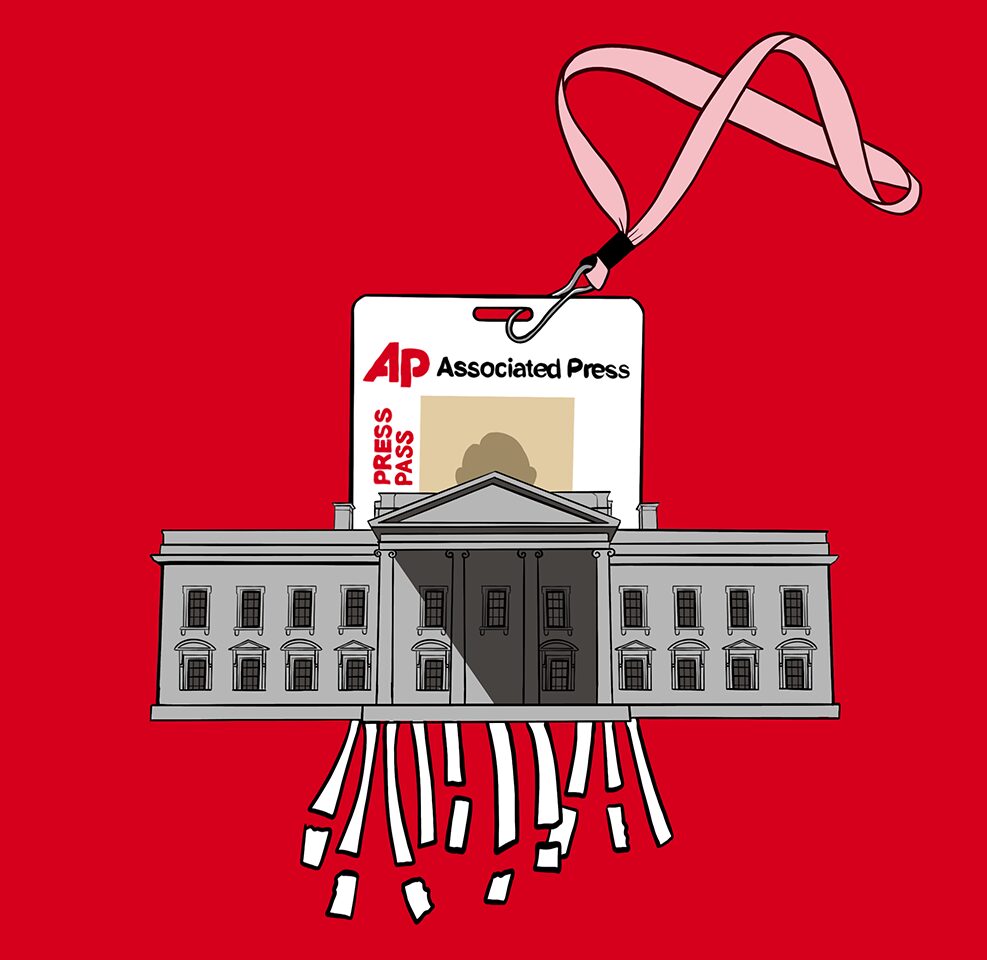
The president, along with Elon Musk and top administration officials, has fostered an environment of hostility toward reporters, frequently using their platforms to discredit and attack the press. This has emboldened other politicians and even members of the public to treat journalists with open contempt, putting journalists at risk and further eroding the press’ ability to hold power accountable.
Since taking office, the administration has attempted to exclude The Associated Press from covering news at the White House for failing to refer to the Gulf of Mexico as the “Gulf of America;” it has essentially shuttered the Voice of America, Radio Free Europe, and other overseas outlets by gutting funding for the U.S. Agency for Global Media; threatened lawsuits over anonymous sources; and weaponized the Federal Communications Commission (FCC) to investigate and intimidate the media.
Trump has filed numerous personal defamation and other lawsuits against media organizations, including the case recently settled by ABC for $16 million and two cases claiming consumer protection violations by CBS and The Des Moines Register. As president, he is putting federal agencies on the case: the FCC has launched investigations into NBC, ABC, CBS, NPR, and PBS. The FCC was established in 1934 as an independent agency to prevent government overreach and political interference in mass communication. In the CBS case, the agency cited “news distortion,” a rare policy typically involving deliberate falsification. Yet this investigation stems from standard edits of a “60 Minutes” interview with Kamala Harris. The probes into NPR and PBS come as Trump and some members of Congress aim to cut their funding.
Under the Trump administration, the FCC is engaging in alarming overreach by bullying private media companies and threatening to reject mergers based on the existence of companies’ diversity initiatives. When the government can turn to regulatory powers to chill or control how the media cover a story, that’s a direct threat to the freedom of the press, and the right of all citizens to be informed.
In a speech before the Justice Department, Trump called CNN and MSNBC “political arms of the Democrat Party” and alleged their reporting is “illegal.” On his Truth Social platform, he criticized the head of Comcast, MSNBC’s parent corporation, and said they “should be forced to pay vast sums of money” for what he said was the damage inflicted on the country. The president also falsely accused media outlets including Politico and The New York Times of having been government-financed organs of the state.
At the same time, Trump, Musk, and others have repeatedly singled out reporters on social media, calling for their firing, publicly attacking their work and even celebrating and encouraging physical violence. Heading into the 2024 election, PEN America banded together with five press freedom organizations to launch the Journalist Safety Urgent Care Helpline on election day, which ran through the first 100 days of the Trump administration to protect and support 200+ US journalists and 35+ news outlets under attack for their work. What this effort made clear is that this targeting disproportionately affects LGBTQ+ journalists, immigrant journalists, and journalists of color, leading to self-censorship and serious digital and physical security risks—including physical attacks.
The administration’s attack on law firms also poses a threat to press freedom. PEN America joined federal court amicus briefs arguing that the Trump administration’s executive orders targeting law firm Perkins Coie, WilmerHale, and Jenner & Block in retaliation for their legal work are a threat to press freedom and free expression. Journalists rely on the work of lawyers to protect their First Amendment interests and defend against government reprisal for unfavorable coverage. In order to hold the powerful to account, journalists also require access to government information, which is frequently contested in courts.
While undermining trusted sources of information, the administration is fostering an environment for falsehoods to flourish. One of Trump’s earliest executive orders of his second term, “Restoring Freedom of Speech and Ending Federal Censorship,” offered an unnecessary restatement of the right to free speech already enshrined in the First Amendment (which was soon to be violated by countless other administration actions), while also enacting new constraints on the government’s ability to work with the tech industry to address disinformation.
While undermining trusted sources of information, the administration is fostering an environment for falsehoods to flourish.
President Trump’s first term was filled with falsehoods — more than 30,000 of them, or an average of 21 a day, according to a tally by The Washington Post. In his second term, the president, Musk, and others in the administration have peddled falsehoods about USAID; the Russian invasion of Ukraine; and diversity, equity, and inclusion initiatives that have been wielded to support the administration’s attacks and its reversals on issues and policies that have long enjoyed bipartisan support. As traditional news outlets shrink and politicians use social networks to disseminate their own versions of truth, the dangers of unchecked mis- and disinformation are stark. Indeed, disinformation is often used as a tool in advancing key parts of the administration’s agenda — for example, in promoting false claims about fraud in government programs and spending. The rampant and deliberate spread of disinformation is a favorite tool of autocrats throughout history. As Hannah Arendt explained in her 1951 book The Origins of Totalitarianism, “The ideal subject of totalitarian rule is… people for whom the distinction between fact and fiction (ie the reality of experience) and the distinction between true and false (ie the standards of thought) no longer exist.”
Attacking Culture and Its Institutions
As an organization dedicated to the transformative power of literature, we recognize attacks on culture as a routine part of the broader assault on free expression. Authoritarians understand that artists, writers, musicians, and performers have the power to shape minds. They have the power to satirize, to tell truths, and provoke critical thinking. Culture is always in the crosshairs of autocrats, who know that words, art, and ideas can challenge orthodoxy and encourage freedom of thought—or be wielded as weapons to distort or erase the stories we tell. While the Trump administration purports to support “free speech” and Elon Musk proclaims we must “legalize comedy!” it’s noteworthy that comedian Amber Ruffin’s appearance at the April 2025 White House Correspondents’ Dinner was canceled after she offered a critique of the administration. .
President Trump began an assault on culture by firing trustees at the Kennedy Center, the nation’s storied—and proudly nonpartisan—cultural institution, and appointing himself its chair. Trumpeting his plan to terminate those “who do not share our Vision for a Golden Age in Arts and Culture,” he told reporters, “it’s not going to be woke.” The move reflected the administration’s broader intent to enforce ideological alignment across sectors.
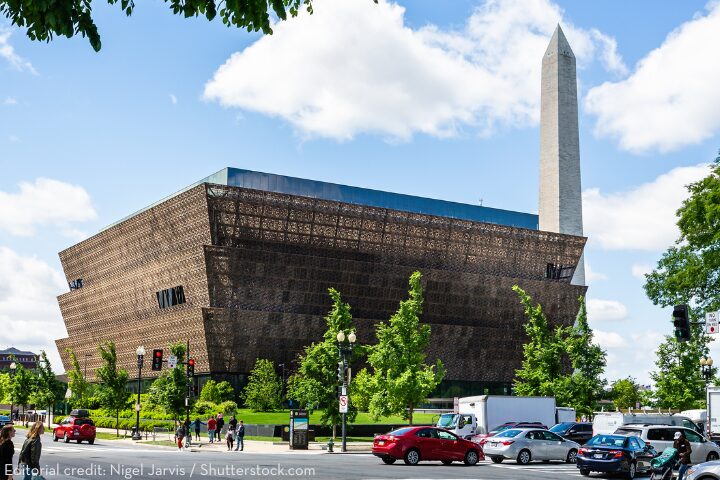
President Trump then put Vice President J.D. Vance in charge of purging “improper ideology” from the Smithsonian Institution’s museums with an order deceptively named “Restoring Truth and Sanity to American History.” The administration accused the Smithsonian of displaying “improper, divisive, or anti-American ideology,” specifically calling out the National Museum of African American History and Culture and Smithsonian American Women’s History Museum. The move signals a deeply alarming threat to the ability of these institutions to document and educate the public regarding the complexities of American history. PEN America joined a letter from the American Historical Association saying this accusation is “simply untrue” and misconstrues historians’ work to explore and understand history in order to shape the future. It insisted that “patriotic history…also helps us grapple with the less grand and more painful parts of our history.”
The administration effectively shuttered the federal Institute of Museum and Library Services, causing libraries across the country to shut down summer reading programs,suspend digital services, and cut services to prison libraries. The cuts also halted progress toward a planned national World War I museum. The agency provides critical funding for libraries and the communities they serve. Twenty-one states are suing over attempts to shut down IMLS.
Cuts directed by Musk’s Department of Government Efficiency (DOGE) resulted in 80% of the staff of the National Endowment for Humanities being placed on administrative leave, and the termination of thousands of NEH grants, including to museums focused on American history. Deep cuts at the General Services Administration, responsible for preserving public artworks, have left the conservation of more than 26,000 government-owned artworks in limbo.
The administration threatened the legal status of the National Gallery of Art. Art exhibitions featuring Black artists from across the Americas and queer artists from Canada were summarily canceled at the Art Museum of the Americas (AMA), a venue run by the Organization of American States; artists who were supposed to appear in the shows said the museum implied U.S. government restrictions on funding “DEI” were to blame. Palestinian artist Samia Halaby had an exhibition canceled for vaguely worded reasons under the shadow of political pressure and in the context of a broader crackdown on Palestinian voices.
New requirements introduced by the National Endowment for the Arts (NEA) and National Endowment for the Humanities (NEH) stipulated that applicants for grants would need to comply with current executive orders and certify that they do not promote diversity and gender expression in their work. While these efforts were quickly held up in court, they represented the extraordinary overreach of the administration’s actions, including the effort to extend viewpoint-based content restrictions to any work engaged in by the recipient, whether funded by the government or not. PEN America joined a coalition of seven national free speech and arts organizations, led by the National Coalition Against Censorship, in condemning the effort. “The threat to freedom of expression, and to the survival of organizations that have relied on government funding, is grave.”
The direct impact of these policies — and the broader chill they cast — are devastating for the economic survival of artists, especially those who rely on federal funding or fellowships, or on institutions that are themselves being pressured to conform to government ideology. Cultural institutions don’t exist in isolation—artists and workers form the ecosystem. When institutions are defunded or politically constrained, it’s the artists who lose income, platforms, and the freedom to create. And it is society as a whole that loses out on the insights, vision, and inspiration they offer.
Attacking Free Expression Globally
Under the leadership of Elon Musk’s DOGE, the Trump administration has essentially — and illegally — demolished the U.S. Agency for International Development (USAID), which implemented the vast majority of U.S. foreign assistance programming, including support for democracy, human rights, and good governance in countries across the globe. Starting with an early executive order entitled “Reevaluating and Realigning United States Foreign Aid,” and despite the attempted intervention of the courts, the administration has essentially undone the entire international development sector, serving a devastating blow to global civil society, and to the writers, journalists, artists, and activists who fight for a more free and just world.
The administration’s attack on USAID has offered a gift to authoritarians and autocrats the world over, both because it guts the very organizations that have sought to hold them to account, and because it has been accompanied by false, ludicrous claims about the Agency and its programs, including that they were “corrupt” and “criminal.” Authoritarians have used such rhetoric against USAID and their own domestic civil societies for years, claiming that freedom of expression and other human rights are foreign concepts being pushed on their populace by American agents. To hear such language coming from the highest levels of the U.S. government is a license for other governments to ratchet up repression; governments including those in Serbia and Hungary have been quick to take advantage.
The Trump Administration’s executive order gutting the U.S. Agency for Global Media (USAGM) threw aside the U.S. government’s longstanding commitment to a free and independent media at home and abroad. For more than 80 years, USAGM, an independent agency funded by the U.S. government, broadcast news and information through six news outlets and played a vital role in reaching audiences living under authoritarian governments. Reaching nearly half a billion people across the globe, the USAGM has empowered free expression in some of the world’s most dangerous environments for reporting and writing.
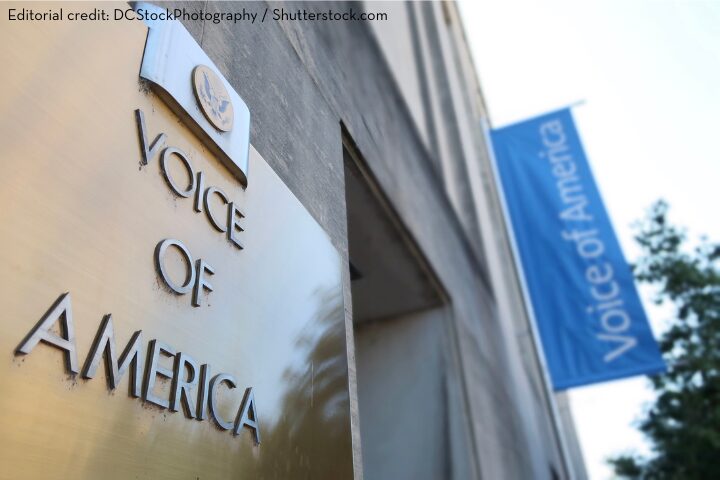
USAGM outlets including Voice of America and Radio Free Europe employed journalists who risked everything to share independent perspectives in the world’s most repressive regimes. Shuttering the agencies would leave writers and journalists at risk around the world. Writers and journalists who worked with USAGM affiliates are frequently targeted by authorities in highly censored or dangerous countries, including Ukraine, Myanmar, and Vietnam. Journalists from these outlets who were already in prison because of their work have now been left stranded without external support. The decision sends a chilling message to those already behind bars for their writing—that they have been forsaken.
The Trump administration’s ideological crackdown has reverberated across the world, emboldening authoritarian regimes to suppress artists, writers, and cultural professionals in their own countries under the guise of national sovereignty, tradition, or security. The decimation of foreign aid to democracy and human rights programs has gutted the global civil society ecosystem, depriving frontline cultural workers and free expression activists of support. The use of ideological exclusion to revoke or deny visas to foreign students, creatives, and academics has also undermined international cultural exchange. Artists and intellectuals whose work critiques injustice—especially from the Middle East, Latin America, and Africa—now face new barriers to safe mobility, with politically engaged voices more likely to be flagged or silenced. The result is a chilling climate that not only isolates U.S. institutions from the global cultural conversation but also denies persecuted artists and writers refuge and recognition.
While the administration promotes itself as a champion for free speech, its actions promote censorship, demand ideological compliance, and chill speech on a national scale, impacting what people feel they can say, and limiting what they are able to teach, read, learn and study.
Conclusion
It has only been 100 days. As overwhelming as the actions documented here are, this is by no means a full rundown of all the steps taken by the administration that affect free expression in the United States and abroad. But these actions alone represent a broad assault on many of the core freedoms that undergird Americans’ right to express themselves freely.
The Trump administration has issued more executive orders than days it has been in office. The titles of these EOs are very often exactly the opposite of the effect of the actions ordered within them. While the administration promotes itself as a champion for free speech, its actions promote censorship, demand ideological compliance, and chill speech on a national scale, impacting what people feel they can say, and limiting what they are able to teach, read, learn and study. All told, we are facing countless new threats to the freedoms that enable a vibrant, diverse, and culturally rich democracy. As PEN America wrote in a joint submission as part of the United Nations Human Right Council’s Universal Periodic Review (UPR) process for the United States: “To say that the accumulated effect of all of these actions is disastrous would be to downplay the situation.”
Freedom of expression is core to American democracy. It is — or was — what set the United States apart from autocracies. “Whoever would overthrow the Liberty of a Nation, must begin by subduing the Freeness of Speech,” wrote Silence Dogood, a pseudonym believed to have been used by Benjamin Franklin, in 1722. The Trump administration’s actions in its first 100 days pose a clear and present danger to the democratic tenets and fundamental rights that have enabled an open society where creativity and expression can thrive. Some of the actions described above have been paused through court action, and many are being litigated. But actions are outpacing court cases, and the chilling effect of the administration’s crackdown is being widely felt. In the face of such threats, it is up to all of us to remain vigilant in defending freedom of expression in all of its forms.
Learn More
-
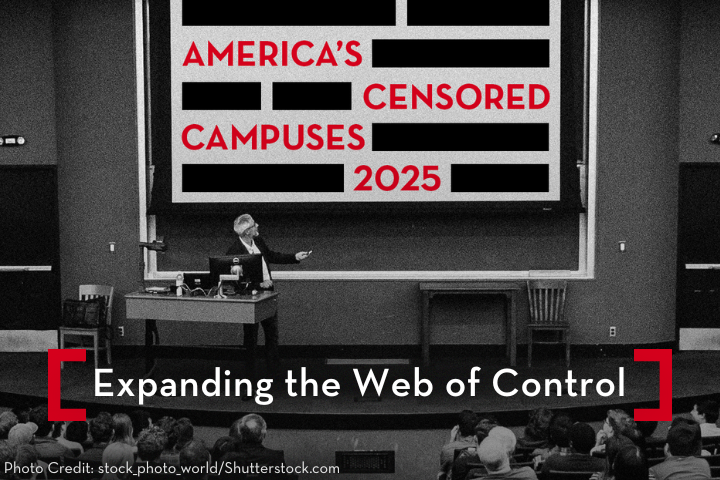
Expanding the Web of Control
Government censorship of free speech and academic freedom has reached unprecedented heights on U.S. campuses as lawmakers extend a web of political and ideological control over the sector.
-
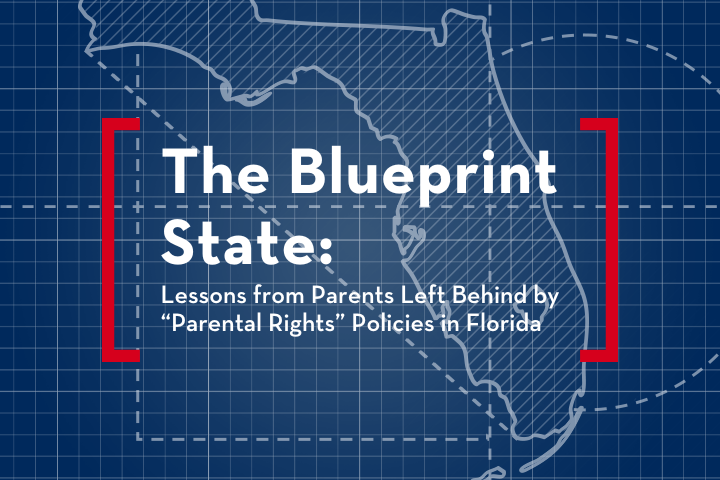
The Blueprint State
A wave of education laws in Florida has had a detrimental impact on the state’s schools, chilling the climate for teaching and learning.
-
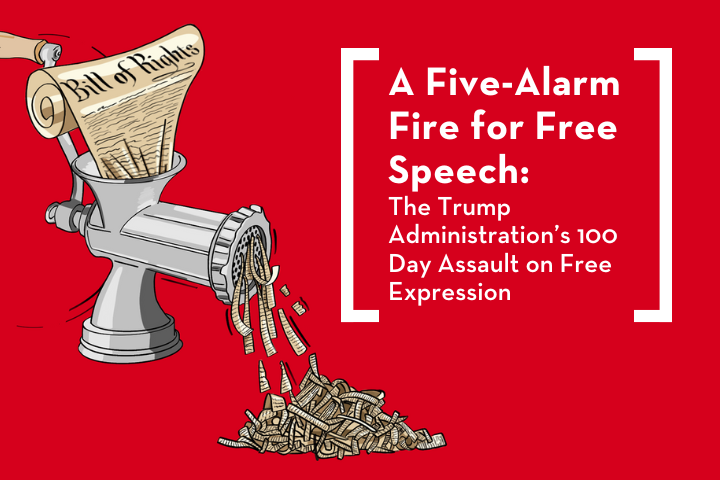
A Five-Alarm Fire for Free Speech
No federal administration has moved as swiftly to exert broad new controls over what people can say, read, learn, research, and think.
-
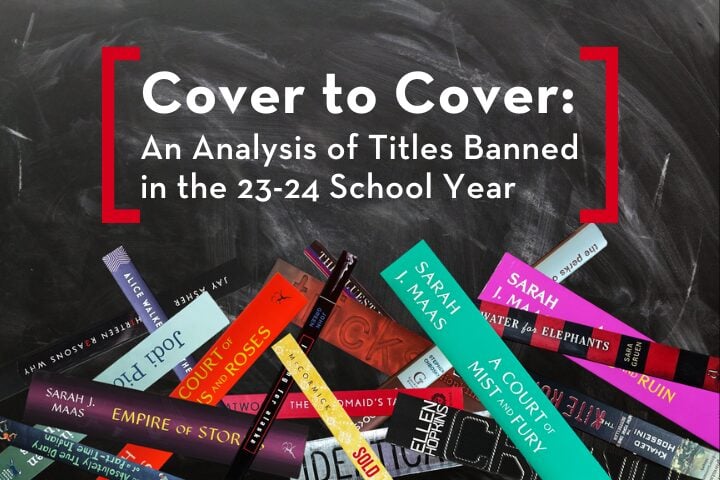
Cover to Cover
Introduction In the 2023-2024 school year, there were more than 10,000 instances of banned books in public schools, affecting more than 4,000 unique titles. These mass book bans were often the result of targeted campaigns to remove books with characters of color, LGBTQ+ identities, and sexual content from public school classrooms and libraries. As book
-
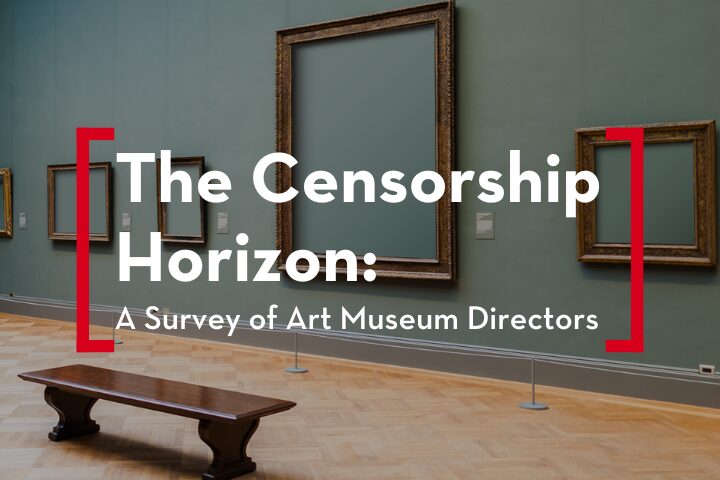
The Censorship Horizon
Introduction Art museums occupy a distinct space in the landscape of American cultural and educational institutions. According to a 2021 survey of 1,200 Americans, both museum-goers and non-visitors described museums as the first and second-most trusted source of information in U.S. society, respectively. For non-visitors, museums were second only to “friends and family,” and for
-
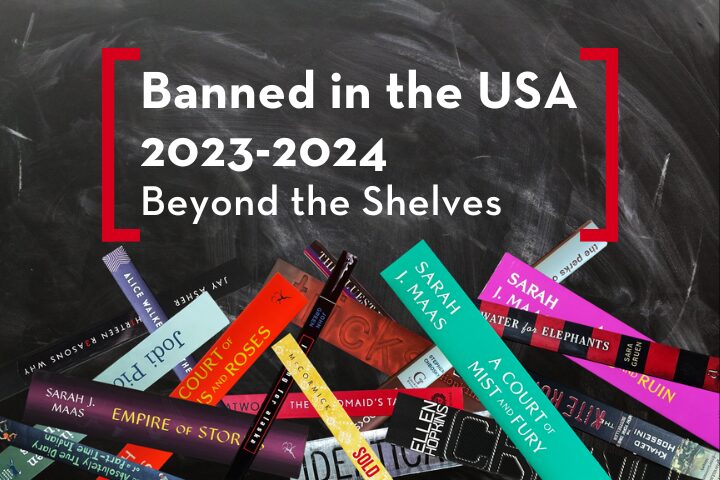
Banned in the USA: Beyond the Shelves
For the last three school years, PEN America has recorded instances of book bans in public schools nationwide. In that time, efforts to erase certain stories and identities from school libraries have not only intensified; book bans have become a bellwether of the chilling of public education writ large. As this report on the 2023-24



